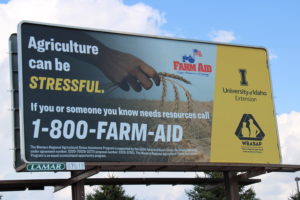Oct 12, 2022University of Idaho Extension raising awareness about rural mental health challenges

A team of University of Idaho (UI) Extension educators is seeking 17 small, agricultural communities willing to host public conversations about the elevated risk of depression and suicide in rural America, as well as local solutions to address the problem.
Each participating community will be asked to develop an action plan identifying a specific concept to help residents who may be struggling with their mental health. In exchange for completing six public discussions, each community will receive $3,000 toward implementing its idea.
Contact, Talje Hoene, UI Extension mental health program coordinator, for more information. Hoene and her team — which also includes UI Extension educators Lance Hansen, Madison County; Bracken Henderson, Franklin County; and David Callister, Butte County — plan to have all the communities selected before the end of October.
The team members underwent training to teach people how to recognize and respond to warning signs of depression and suicide. They’ll facilitate separate, complementary sessions in the rural communities, lasting six hours for youth and eight hours for adults. Those who complete the course will receive mental health first aid certification.
Furthermore, UI Extension is posting billboards throughout the state — four in northern Idaho and six in the state’s southern, central and eastern regions — directing farmers and ranchers who are overwhelmed by stress to Farm Aid and the Farm Crisis Center. The billboards, which will remain posted throughout the fall, read: “Agriculture can be stressful. If you or someone you know needs resources call 1-800-FARM-AID.”
“We’re searching for small communities to work with because we’re trying to reach that harder to reach population. They have their own culture. They’re close-knit. They don’t necessarily seek help from outside,” Hoene said.
Communities will have the flexibility to invest their funding in a small project that best meets their unique circumstances. For example, a community might opt to expand a local food pantry or elect to buy a pizza oven for hosting civic wellness events.
The Extension team will lead the discussions. The conversations are open to anyone, but the team will prioritize farmers and others who work in agriculture, which is an especially stressful field.
According to a study published Sept. 5, 2021, in the American Journal of Industrial Medicine, using data from 1986 through 2014, the age-adjusted suicide mortality rate per 100,000 of farmers and farm managers was 22.3, compared with 15.3 across all other occupations. A 2019 study by American Farm Bureau Federation found 87% of agricultural workers agreed cost, embarrassment and lack of awareness posed obstacles to accessing mental health care.
Furthermore, half of the agricultural workers said they had trouble finding a therapist in their community.
“The main thing we’re finding with this population is lack of control is a big problem,” Hoene said. “They can have a freak weather occurrence and their entire crop is ruined. A lot of farmers are having to give up their family farms because they can’t keep up with the bill payments.”
Callister understands the stress and profound disappointment of losing a family farm all too well. He’d farmed with family for 25 years in Butte County until 2018, when his family members retired and he couldn’t buy them all out. At age 53, Callister found himself seeking a new career.
“I’ve dealt with the heartache of losing a farm, feeling like I’d let past generations down because I wasn’t able to keep Grandpa’s farm going,” Callister said. “You start feeling isolated. There is still a stigma in our society — and maybe it’s more so in rural society — that you should be able to pick up and go. That’s not the case if somebody has a heart attack. You don’t tell them to buck up and deal with it.”
Callister is grateful for the opportunity to help other farmers avoid similar outcomes as an Extension educator. He’s a strong advocate for farm succession training to help farmers plan early to pass down their properties to the next generation.
Hanson is aware of several recent suicides in rural Driggs, and in the early 1990s, his wife lost a couple of extended family members who were agricultural producers from Driggs to suicide.
“For me this is about just getting the discussion started,” Hanson said. “I think a lot of times there’s the discussion and that’s all there is. I’m hoping we can develop an actual plan and we can do our part as Extension agents to give them resources so they can see this further than a couple of discussions we have with them.”
As an Extension educator, Henderson has worked with a few farmers who died of suicide.
“We need to open up that dialogue so that people are willing to admit this is an issue in our agricultural communities,” Henderson said. “But that is just the first step. I hope it becomes more socially acceptable to open up when you are struggling and not just have ‘good’ as the default answer when someone asks, ‘How are you doing?’”
The program to launch community discussions and implement action plans is funded with a $200,000 Western Regional Agriculture grant. Western Regional Agriculture also awarded a separate $10,000 grant to fund the 10 billboards, which are expected to be viewed by about 275,000 motorists per week.














